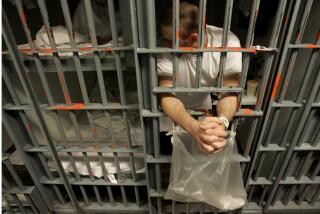A Wrong Turn on ‘Three Strikes’
- Share via
A state Supreme Court decision Thursday on California’s “three strikes” law focuses mainly on the reach of the statute but may ultimately do more to demonstrate the law of unintended, and unwelcome, consequences. In a 4-3 decision, the high court held that a single act can count as more than one crime under the 1994 law. The measure, aimed at keeping repeat offenders behind bars, doubles the sentence for a second violent felony conviction and carries a 25-years-to-life term for anyone convicted of a third felony.
The case before the court involved Russell Benson, convicted of stealing a carton of cigarettes, a so-called “wobbler” crime, one that prosecutors could have chosen to file as a misdemeanor. Benson was sentenced to 25-years-to-life on the grounds that the conviction was his third felony. Fifteen years earlier, he had been convicted of burglary and assault.
The decision that Benson’s earlier conviction counts as two strikes may affect scores of criminal defendants and now means that a single criminal act can give rise to three separate felony charges, potentially landing an offender in prison for life.
That result is troubling because it, in effect, amplifies the extraordinary discretion that the “three strikes” law already gives to prosecutors by allowing them to charge crimes as felonies or misdemeanors. Now their decisions about how many felonies may arise from each criminal act carry the potential for 25 years to life, regardless of a defendant’s prior record.
The court’s decision will likely increase the pressure on trial judges to intervene at sentencing to trim prosecutorial excesses. That’s an option should be weighed when the prosecution overloads the charges.
More to Read
Sign up for Essential California
The most important California stories and recommendations in your inbox every morning.
You may occasionally receive promotional content from the Los Angeles Times.













